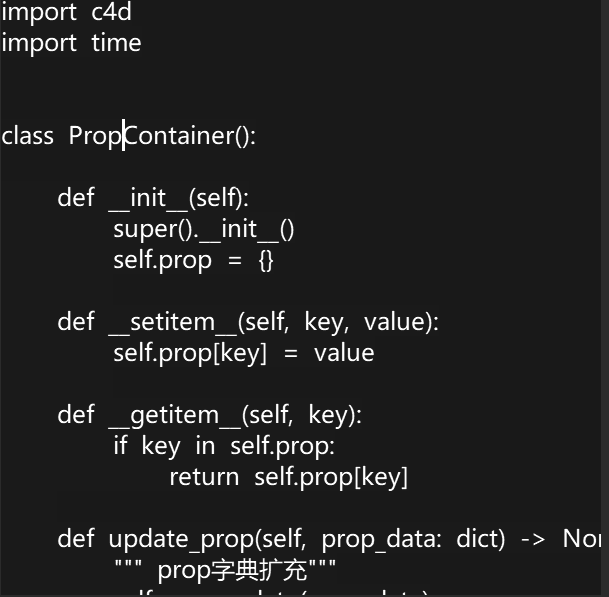Hello @HerrMay,
Is the multiplication of a matrix with a vector (mg.off = mg * p) essentially the same what mg * c4d.utils.MatrixMove(vec) does?
No, mg * p multiplies a matrix by a vector which will yield the transformed vector p'. mg * c4d.utils.MatrixMove(vec) on the other hand multiplies two matrices, yielding the combined transform of them, a new matrix.
What would be equivalent to mg * p is mg * c4d.utils.MatrixMove(p) * c4d.Vetcor(0, 0, 0). Please note that the whole subject is also out of scope of support as declared in the forum guidelines. I understand that the subject is a common barrier for the more on the artist-sided leaning users of ours, and I help where I can, but we cannot teach you vector math, linear algebra, or however you want to label this subject.
Find below a short code example.
Cheers,
Ferdinand
Output:
M = Matrix(v1: (1, 0, 0);
v2: (0, 1, 0);
v3: (0, 0, 1);
off: (0, 100, 0))
p = Vector(100, 0, 0)
M * p = Vector(100, 100, 0)
M * c4d.utils.MatrixMove(c4d.Vector(100, 0, 0)) = Matrix(v1: (1, 0, 0);
v2: (0, 1, 0);
v3: (0, 0, 1);
off: (100, 100, 0))
M * c4d.Vector(100, 0, 0) = Vector(100, 100, 0)
N * c4d.Vector( 0, 0, 0) = Vector(100, 100, 0)
M * c4d.utils.MatrixMove(p) * c4d.Vector(0, 0, 0) = Vector(100, 100, 0)
Code:
import c4d
# Let us assume #M to be the global matrix/transform of some object #op. View it as a tool to
# transform a point in global space into the local coordinate system of #op.
M: c4d.Matrix = c4d.Matrix(off=c4d.Vector(0, 100, 0))
# The matrix #M now has this form:
#
# | v1 1 0 0 | # The "x-axis" of the coordinate system defined by #M.
# | v2 0 1 0 | # The "y-axis" of the coordinate system defined by #M.
# | v3 0 0 1 | # The "z-axis" of the coordinate system defined by #M.
# ----------------------
# | off 0 100 0 | # The origin of the coordinate system defined by #M.
#
# I.e., #M has the standard orientation and scale and only translates all things by 100 units
# on the y-axis. So, the object #op would have the Euler angles (0°, 0°, 0°), the scale (1, 1, 1)
# and the position (0, 100, 0) in world coordinates.
# Define a vector #p to transform and print both #M and #p.
p: c4d.Vector = c4d.Vector(100, 0, 0)
print(f"{M = }")
print(f"{p = }")
# Transforming a point #p by a matrix #M will yield a point #q that is in the same relation to #M
# as #p is to the global frame.
q: c4d.Vector = M * p
# #q will be the vector (100, 100, 0) because , (100, 100, 0) and #M are the same relation as #p
# and the identity matrix are, a.k.a., the world frame. In a less technical way, (0, 100, 0) is the
# origin of the coordinate system defined by #M. And to express #p in a manner as if #M would be
# its coordinate system, we have to add (0, 100, 0), because that is the new origin. For orientation
# and scale it works more or less the same, I would recommend having a look at the Matrix manual or
# Wikipedia article on the subject.
print (f"{M * p = }")
# We can construct new transforms in many ways (again, Matrix Manual :)), one of them is by
# combining multiple transforms via matrix multiplication.
# We "add" the translation transform (100, 0, 0) to #M. Note that matrix multiplication is not
# commutative, i.e., "M * N = N * M" does not always hold true. In this case it would because only
# translations are involved.
N: c4d.Matrix = M * c4d.utils.MatrixMove(c4d.Vector(100, 0, 0))
print(f"{M * c4d.utils.MatrixMove(c4d.Vector(100, 0, 0)) = }")
# To get the same point as #q when multiplying a point #r with #N, we must pick the null-vector
# because the origin of #N is already at where M * (100, 0, 0) is.
print (f"{M * c4d.Vector(100, 0, 0) = }")
print (f"{N * c4d.Vector( 0, 0, 0) = }")
# We can also do it in one operation:
print (f"{M * c4d.utils.MatrixMove(p) * c4d.Vector(0, 0, 0) = }")






